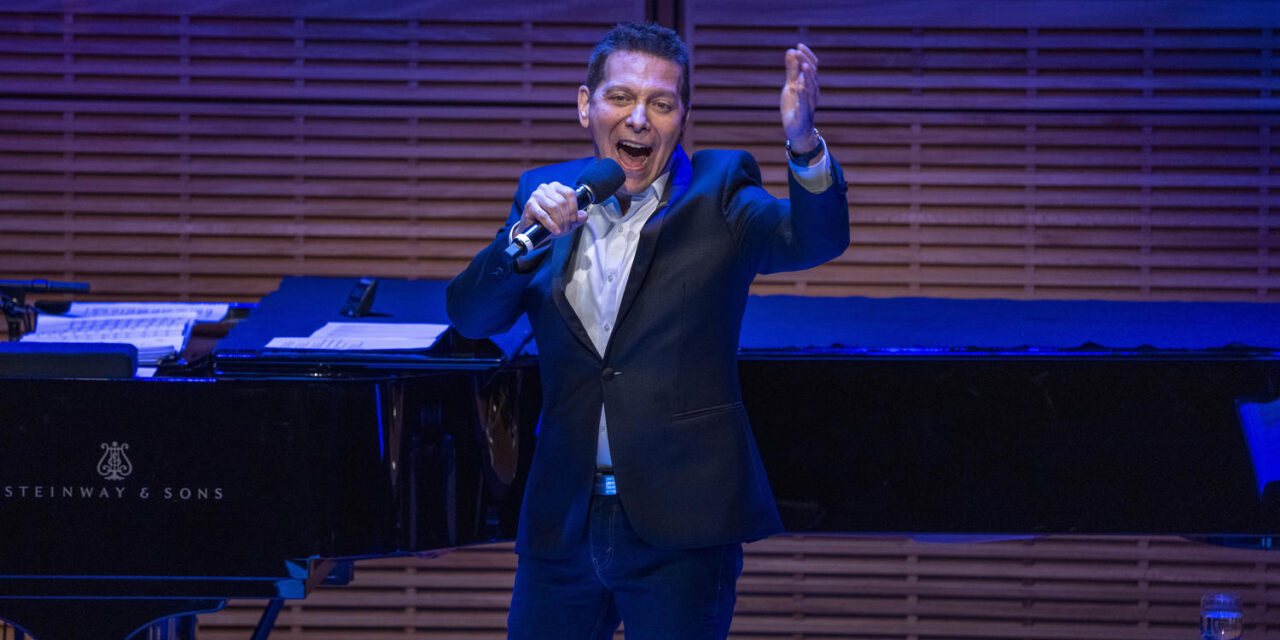A Century of Romance: 100 Years of Love Songs
By Marilyn Lester . . .
This edition of Standard Time, the long-running series at Zankel Hall with Michael Feinstein, was anything but standard. The energy in the room was extra high, driven by a Feinstein who was “on”—so much so it would be easy to believe he’d just won a million-dollar lottery.
Under any circumstances, Feinstein is one of those entertainers who can always be relied on for a thoroughly enjoyable (and educational) program. He’s got a knack for filling audiences in on the provenance of the material he’s presenting with a natural ease that sets up a song perfectly. That dynamic was present in A Century of Romance: 100 Years of Love Songs, as the years were ticked off with a sublime choice of music.
This extra-bright, very relaxed and always humorous version of the main man began with an ode to love, Cole Porter’s upbeat 1938 “At Long Last Love.” Moving back to the start of the promised 100 years, up next was “It All Depends on You,” written in 1926 by Ray Henderson, with lyrics by Buddy De Sylva and Lew Brown—writers that Feinstein declared were terribly underrated. This version was delivered almost as a blues—slow and with a mournful edge. Pianist Tedd Firth inserted bona fide blues riffs into the piece, emphasizing the interpretation. Firth, Feinstein’s go-to piano man, also played a stellar introduction to an equally eloquent “I Can Dream, Can’t I” (Sammy Fain, Irving Kahal, 1937) which flowed seamlessly into another Fain-Kahal tune, “I’ll Be Seeing You,” written in 1938 but finding deeper meaning during the soon-to-be World War II years. Also backing Feinstein were bassist David Fincke and drummer Mark McLean, two musicians extraordinaire. As a tribute to the late Marilyn Bergman, Feinstein later sang Ballroom’s “Fifty Percent” (1978, Billy Goldenberg, Marilyn and Alan Bergman), without changing the gender of the object of the singer’s love. Feinstein was at the top of his game in this delivery, in building an arc of storytelling, his sensitive interpretation beautifully impassioned and realized.
Special guest, the extraordinary jazz singer Catherine Russell, added tremendous energy to an already vibrant program. In the jazz world, the term “jazz royalty” is often used to describe second or third generation performing offspring of notable vocalists and musicians. Russell fits the bill, being the daughter of pianist-composer-bandleader and Louis Armstrong’s long-time musical director, Luis Russell, and Carline Ray, a pioneering vocalist-guitarist-bassist who performed with the International Sweethearts of Rhythm, Mary Lou Williams and Sy Oliver, among others.
Russell’s solo turns were swinging, with Firth moving into one of his happy places: jazz. With a Latin beat, she excelled on a tune that was originally written in Spanish in 1934 by Mexican songwriter Maria Grever, “What a Difference a Day Made,” also recorded as “What a Difference a Day Makes.” Another treat was a song brought to her by a student, which she immediately attuned to, Richard Whiting, Newell Chase and Leo Robin’s, 1930 hit “My Ideal.” Duets between Russell and Feinstein were especially delightful; there appeared to be a genuine love and admiration between the two, yielding great chemistry (and excellent harmony) as in their delivery of “You Go to My Head” (1938, J. Fred Coots, Haven Gillespie).
Another guest, Sadie Fridley, a new college student from upstate New York, performed a number as a consequence of earning the top honor at the 10th annual Songbook Academy vocal competition in 2019, sponsored by Feinstein’s American Songbook Foundation. With pleasant voice she delivered a technically excellent “A Fine Romance” (1936, Jerome Kern, Dorothy Fields), showing great promise that the future will no doubt allow her to develop.
There’s always a segment in Standard Time when Feinstein takes the piano bench and solos to his own accompaniment. While he’s accomplished at both playing and singing, this segment of the show served to illustrate how much more he shines as a vocalist when not also working at the keys. With a comic turn he took requests shouted from the audience and then pretended to ignore them—but wound up taking one, “My Romance” (1935, Richard Rodgers, Lorenz Hart). A very fine “I Won’t Send Roses” (1974, Jerry Herman) from Mack and Mabel also was sung with splendid emotive interpretation. Returning the piano to Firth, the evening ended with a swinging “For Once in My Life” (1968, Ron Miller, Orlando Murden), closing out the Standard Time Spring season on a very high note.
Photo: Richard Termine


















